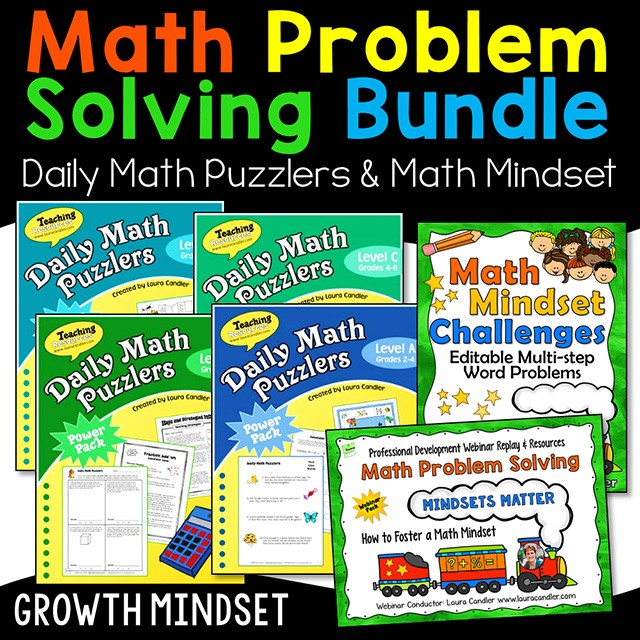
 Math Problem Solving: Mindset Matters Webinar
Math Problem Solving: Mindset Matters Webinar Math Mindset Challenges: Editable Multi-step Word Problems
Math Mindset Challenges: Editable Multi-step Word ProblemsIncludes ALL 4 Daily Math Puzzlers, Math Mindset Challenges (Editable Word Problems), and the Math Problem Solving Webinar!
Do you have a wide range of ability levels in your classroom? The Math Problem Solving Bundle makes it easy to differentiate instruction to meet your students’ needs! You can purchase these items individually, but the bundle price will save you more than $15!

What if you could significantly improve your students’ problem- solving abilities in just 15 minutes a day? A mere 15 minutes per day adds up to 45 hours of instruction on problem solving! Even 10 minutes a day would result in 30 hours of problem-solving instruction. What if you found a method that involved no advanced preparation yet provided a clear and sequential approach to problem-solving? And what if your students began to look forward to those 10 to 15 minutes of math instruction? What if they actually enjoyed the problems and asked you for MORE????
No need to wonder . . . Daily Math Puzzlers is that program! These math problems were field-tested by dozens of teachers all over the world, and their kids were actually asking for more! The program helped students develop confidence in their problem-solving abilities. As a teacher, you’ll enjoy the step-by-step instructions for reviewing calculator skills, teaching problem-solving steps and strategies, and providing a variety of challenging and engaging math problems.

So I decided to create my own math problem-solving program, one that I could implement in just 10 to 15 minutes a day. I knew I would need something simple yet effective, a program that didn’t require me to search for new word problems every day. I developed and used this program last year, and I knew I had a winner when I saw my results on our state math exam. WOW! At the beginning of the year, only 62% of my students had passed the previous year’s math exam. At the end of the year, 87% passed! This year I’m going for 100%!
After experiencing those results, I knew I had to share my program. The basic plan centers on the Daily Math Puzzler worksheet which has four word problems that can be solved in a variety of ways. You distribute the printable on Monday, and students work out the answer to the first problem. You quickly spot-check the answers and circle the “check plus” symbol for anyone who found the correct answer and showed all their work. On Tuesday, you teach a brief mini-lesson on how to solve that problem. Students correct their answers and move on to the next problem. If you follow that sequence, you’ll wrap up the fourth problem on Friday. Simply collect the worksheets and assign a grade based on accuracy and class participation. It’s that easy!
Daily Math Puzzler features include:
Each book includes a set of problems designed for a span of grade levels that overlap to make the program more flexible. The levels and grades below are only approximations, so be sure to preview each level or download the free sample problem pages below.
Level A – Grades 2, 3 and 4
Level B – Grades 3, 4, and 5
Level C – Grades 4, 5, and 6
Level D – Grades 5, 6, and 7
If you’re not sure where to start your students in the program, sign up to receive my free Problem Solving Assessments and give them the pretest. This assessment will quickly show you your students’ strengths and weaknesses in problem solving. (Answer keys included.)
The free problem solving worksheets on this page don’t have answers, but the ones in the Problem Solving Assessment pack and the Daily Math Puzzler books do include answer keys.

I included calculator skills in the Daily Math Puzzler program because students in many states are allowed to use calculators on a portion of their state math tests. I have found that many students don’t know how to use a calculator properly, and they need instruction in this area. If we hand them a calculator for the test but don’t teach them how to use it, they will make careless errors that could be avoided. For example, calculators don’t display dollar signs and ending zeros with money amounts. Many students don’t know that 3.1 means $3.10 instead of $3.01.
I also find that students are more willing to use higher-level thinking skills when they are solving problems if they don’t have to worry about basic calculations. Computation skills are very important, but I don’t teach them at the same time as problem solving.
 Free Calculator Skills Quiz
Free Calculator Skills QuizIf you’d like to test your students on their calculator skills, download and administer the free Calculator Skills Quiz shown here. Tell your students that they may only use a calculator and work out the answers. If they don’t get 100% of the problems correct, take a look at the problems they missed to figure out which skills are missing. If this test is too difficult, preview each version of the Daily Math Puzzlers above and take a look at the tests for each level.
You will have to be the judge of whether calculator instruction is needed in your classroom. I think it’s an important life skill, but if your students are not allowed to use calculators on standardized tests, you can skip over the calculator activities. That portion of the Daily Math Puzzler program is optional, and leaving it out won’t have a major impact on the success of the overall program.